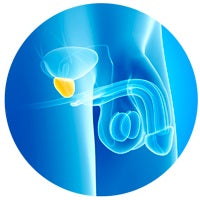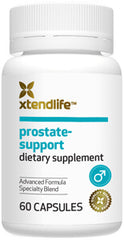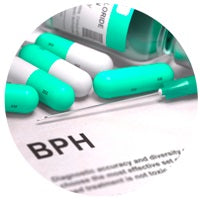- Introduction
- What is the Prostate?
- What is an Enlarged Prostate called?
- So why the Finger?
- What generally happens after the Digital Prostate Exam?
- What is the Treatment and what is hoped to be Achieved?
- Is an Enlarged Prostate Preventable?
- A Natural Alternative to Drugs and the Side Effects that can accompany them!
- Is an Enlarged Prostate Preventable?
- Effective Natural Ingredients for an Enlarged Prostate!
- PSA (Prostate-Specific Antigen) tests
- Sex, Lies and Misconceptions!
Should a man become a raving Sex Addict? - Another Taboo Subject!
- In Summary
- In Conclusion
- My Personal Recommendations

I have been prompted to write this as a result of the publicity which is given to ‘Blue September’ each year as part of ‘Prostate Awareness Month’. You may have seen the television adverts showing a male Doctor snapping on a surgical glove and pointing his finger in the air! The message is urging men to go and have a ‘digital prostate exam’. The ‘digital’ part of the exam has nothing to do with computers… it is a politically correct term for the digits on our hand, otherwise known as fingers.
Where is the prostate?
In case you are not sure where the prostate resides it is between the penis and the rectum with a single point of access.
So, now you have probably guessed where the gloved finger ends up… haven’t you? Yep, right up the back passage. Having a doctor do that to you is not a prospect that most men would relish, but the pressure is going on for men to have a regular ‘digital prostate exam’ particularly if they are over 50.
- But, is it really necessary?
- Why is it done in the first place?
- What is hoped to be achieved?
- What happens next?
But first…
What is the prostate?

Let me give you a short description. You can also get a wealth of information about this small but very important male gland if you Google it. (When doing your research make sure you cross reference anything and mix in a good dose of common sense).
OK, when I say small, I am referring to a gland the size of a walnut… that is about the size of a normal healthy prostate.
As men get to around 50 years of age many experience an enlargement of their prostate. The size can expand to that of a lemon, or larger. It is easy to know if your prostate is enlarged because it will normally result in nighttime visits to the bathroom. This is because the prostate gland puts pressure on the ‘urethra’ which is the tube that urine passes through on its way from the bladder to the penis. The prostate gland wraps around the urethra. As the prostate expands it puts pressure on the urethra making urination difficult.
This can lead to urinary tract infections, urine retention, and potentially kidney damage, all of which can potentially lead to serious health implications.
There are several potential causes of an enlarged prostate. These may include an increase in the number of prostate cells, a decline in the number of cells dying, or an infection causing inflammation. Hormones can play a significant role in enlargement particularly the ratio of dihydrotestosterone (DHT) to testosterone. DHT is produced from testosterone by the action of a specific enzyme. The imbalance of DHT and testosterone occurs as a man ages and testosterone levels decline while dihydrotestosterone does not.
What is an enlarged prostate called?
The common term for it is ‘BPH’ which stands for ‘Benign prostatic Hyperplasia’. As you guessed this is not a cancerous situation although an enlarged prostate might develop into prostate cancer.
It is important to do something about an enlarged prostate for the reasons that I raised above.
So, why the 'Digital' exam?
Do you really need to subject yourself to this invasive procedure to establish that you have an enlarged prostate? You would normally be aware of it due to discomfort. There is an argument by some health professionals that this exam should be done not only to check if the prostate is enlarged but also to check if there are any lumps or abnormalities on the prostate that could indicate prostate cancer, and which would otherwise go undetected.
That would be fair enough if there was strong evidence that this really helped prevent the risk of developing prostate cancer… but, is it really worth doing? There are some clinics that will not do a digital prostate exam because of the risk of misdiagnosis, possibly due to different interpretations by different physicians.
The American Academy of Family Physicians created a list of 15 procedures for a variety of ‘ailments’ for both physicians and patients that are in ‘question’. Both the prostate digital exam and PSA screening are included in their list. For more details click here.
Because of misdiagnosis, the sad reality is that there are many thousands of men out there who have had treatment for prostate cancer when they either didn’t have it or, it was a form of non-aggressive cancer that stays within the prostate with a very low risk of it becoming terminal. Many of these men who have had invasive surgical and non-surgical interventions now have to put up with sexual dysfunction, incontinence, and rectal bleeding etc.
There are some parallels between prostate cancer intervention and breast cancer intervention with plenty of potential for misdiagnosis. The same principle applies to some of the treatment methodologies where the serious potential for negative side effects is often not spelled out.
I am not saying that you should not have a ‘digital exam’. Just don’t panic if the Doctor tells you that it is enlarged or he suspects that you could possibly have prostate cancer. Take the information and start your research and get other professional opinions and then decide what action if any you should take.
What generally happens after the ‘digital’ exam?
A relatively small percentage of men will progress to the point of either initiating intervention for prostate cancer or a biopsy which has its own dangers. Some medical institutions feel that it is better to let ‘sleeping dogs’ lie in the case of prostate cancer rather than proceed with a biopsy.
Only a small percentage of men will generally have it suggested that intervention is needed for prostate cancer, but a LOT of men will be told that their prostate is enlarged and that they should go on medication to shrink the prostate.
This is when the standard ‘Western’ medical system kicks into play. When I refer to ‘Western’ I am referring to the Anglo-Saxon countries… Canada, UK, Australia, New Zealand and of course the USA.
What is the treatment and what is hoped to be achieved?
PROSCAR may increase the chance of a more serious form of prostate cancer.
The most common side effects of PROSCAR include
- erection issues (impotence)
- decrease in sex drive
- decreased volume of ejaculate
- ejaculation disorders
- enlarged or painful breast - lumps, pain or nipple discharge
The following have been reported in general use with PROSCAR and/or finasteride at lower doses
- allergic reactions - rash, itching, hives, and swelling
- testicular pain
- erection issues after stopping the medication
- infertility and/or poor quality of semen
- depression
- decrease in sex drive
- in rare cases - male breast cancer
Most physicians will prescribe a class of drugs containing finasteride or dutasteride, produced by Merck and GlaxoSmithKline respectively, and known as Proscar and Avodart. (Merck also has another product called Propecia with a lower dose of the active ingredient to help with male pattern baldness). These products are indeed generally effective for shrinking the prostate but men potentially pay a high price for this effectiveness. Not so much in terms of the initial financial cost, but in their future health and well-being.
Look right at what ‘extras’ these men on Proscar may get from this drug… which they hadn’t bargained for:
The side effects listed to the right are directly from the Mercks website. You can check it out yourself by clicking here.
But the potential risks don’t end there (and this is ironic). As a result of undergoing drug therapy for an enlarged prostate, you may be increasing your risk of developing some forms of prostate cancer. These drugs used to be sold on the premise that not only will they reduce the size of your enlarged prostate but they will also reduce the risk of you developing prostate cancer.
But…the US FDA has now prohibited GSK and Merck from claiming that these drugs prevent prostate cancer. This is because it was found that they created a small but significant risk of users developing a more serious form of high-grade prostate cancer. This warning is now printed on the label. Click here for more details.
Is an enlarged prostate preventable?
The official line is that it is not.
“Unfortunately, there isn’t a preventative strategy yet, although researchers are looking at dietary factors,” says Kevin T. McVary, M.D., a professor of urology at Northwestern Memorial Hospital in Chicago and a spokesman for the American Urological Association (AUA). “My advice to anyone wishing to avoid BPH is exercise and staying trim — but that is based on a hunch, not on overwhelming medical evidence.”
I strongly disagree with this statement, although I agree with him about exercising and staying trim… but that applies to all aspects of health.
I will tell you shortly why I disagree so strongly, and what I believe from my own research is an effective way of supporting the health of the prostate and helping to reduce the risk of it becoming enlarged.
But first let me tell you about…
A natural alternative to drugs and their side effects
For many years and still today physicians in Europe and in particular Germany have been prescribing a natural remedy for an enlarged prostate. There is more than one natural remedy and many of them are effective… PROVIDING the ingredients used are high-quality pure concentrated extracts.

Our R&D (Research and Development) team spent considerable time almost fifteen years ago researching this issue, in particular what was being successfully used in Europe. I had initiated this as I was developing signs of an enlarged prostate at that time (I was 52 years of age then). We found that there were a number of ingredients that had good evidence that they can help to maintain a healthy prostate and reduce the risk of it becoming enlarged, without any of the negative side effects of drugs. This was mainly from European research. These same natural ingredients had evidence to support a general improvement in overall sexual health.
As a result of this research, we incorporated a number of these ingredients into our flagship products called Total Balance Men’s and Total Balance Men’s Premium.
After about a year my nocturnal visits were down to about one per night from about three or four. Six months after that they had ceased altogether and now at the age of 68 I still have an uninterrupted night’s sleep and there is not the slightest sign of any enlargement of my prostate.
Interestingly my PSA (Prostate-specific Antigen) is 0.7, which is typical of a much younger man, and it has been consistent for years. More about PSA shortly and the things you need to watch out for.
Effective natural ingredients for an enlarged prostate
As I mentioned earlier there are a number of good natural nutrients to support prostate health. Over the years many experts have repeatedly reaffirmed that the two most effective ingredients are ‘Stinging Nettle Extract (Urtica dioica)’ and ‘Saw Palmetto’. We have been using these in Total Balance Men’s and Total Balance Men’s Premium for years, along with many other valuable nutrients.
Recently we have introduced a new formula targeting just prostate health using the two most effective ingredients in a ratio supported by the body of independent clinical research.
Clinical Trials
If you follow this link you can see some of the results of these clinical trials yourself. Please note: These trials were not conducted with our product but they were conducted with similar ingredients. We have sourced the purest and most potent forms of Saw Palmetto and Stinging Nettle Extracts for use in our Prostate Support product so we can provide you with the best possible product.

We have called this product Prostate-Support. It is not the only product on the market like this. If you don’t buy our Xtendlife product just ensure that the ratios of saw palmetto and stinging nettle are similar and that the stinging nettle extract is from the root, not the leaves. This is important to ensure you are using a quality product.
Note: These ingredients are excellent for targeting prostate health and helping to reduce the risk of an enlarged prostate, but there are other things that you can add which will benefit the long-term health of the prostate. I will address these later in this article and the reasoning behind this.
PSA (prostate-specific antigen) tests
You have probably heard about the PSA tests. These are non-invasive blood tests that measure the level of prostate-specific antigens in the blood. There is evidence to support an elevated level being linked to a higher risk of prostate cancer. There are some aspects of this test that you may not be aware of, but you should be.
Firstly, it is possible to get a false reading and therefore raise false alarms. When someone is under severe stress the levels can be temporarily raised significantly. With regard to levels, a measurement of 4.0 or lower is generally considered to be healthy and all clear. However, it is possible that a man’s level can soar to 25 or more without actually having prostate cancer.
When levels soar over a short period of time it is more likely that it is due to other causes. I know of examples where this has happened to men and then a few weeks later it is back to normal. However, often your Doctor would be rushing you in for a biopsy and it may not be necessary. A prostate biopsy is not a pleasant thing and complications may arise which can lead to permanent discomfort.
Many urologists recommend taking a bit of time and having 2 or more PSA readings before moving forward with a biopsy. Also talk to your Doctor about doing more than just the standard PSA test, for example, testing for ‘Free PSA’ which can support the standard total PSA test. If the standard PSA test results are consistently high, before going ahead with a biopsy it may be appropriate to have a digital prostate exam. You can learn more about the different forms of PSA testing by clicking here.
Note: If your doctor is going to draw some blood for a PSA test, AND is intending to do a digital prostate exam, ensure that he draws the blood first as there is evidence suggesting that the digital exam can have an immediate impact on the PSA reading.
Now we come to the interesting bit… sex, lies, and misconceptions!
Firstly, about sex! Reading about the potential side effects which I have referred to above, if you take Proscar or similar drugs you will know that your sexual health could be compromised permanently. Likewise, surgical intervention can also destroy your sex life.
I don’t have to say what impact that permanent sexual dysfunction is likely to have on the sense of well-being for a man and his partner. That is bad enough, but there is more to it than that problem alone. If a man can no longer be sexually active and the prostate is not removed it could become further damaged.
To explain;
The prostate serves the purpose of producing prostatic fluid that nourishes and protects sperm. During ejaculation, it squeezes this fluid into the urethra, and it is expelled with sperm as semen. There is always a small accumulation of prostatic fluid in the prostate which remains there until expelled as part of the ejaculation process.
If a man does not have regular sex or ejaculation, then the prostatic fluid remaining in the prostate will become stagnant as will any ‘pocket’ of static fluid in the body. It may become a breeding ground for bacteria and viruses.
Based on various research, it seems that the stagnation of this prostatic fluid is likely to be one of the significant contributors to prostate health issues. It was estimated in a substantial study in Europe (published in JAMA. Journal of the American Medical Association), that men who ejaculate more than 20 times a month have a 33% reduction in the risk of developing Prostate Cancer.
Apart from evidence such as this, it would seem logical just based on common sense that this would likely be the case. Look how quickly a pool of water can become a stagnant breeding ground for disease in the tropics. I believe that it stands to reason the same can happen within the body. We also know how constipation can poison the body.
So, does this mean a man should become obsessed with sex?
No, I am not suggesting anything like that but rather reinforcing that normal sex or ejaculation is an essential part of maintaining a healthy prostate and thus a healthy body. The increasing incidence of having an unhealthy and enlarged prostate would tie in with a reduction in sexual activity as a man ages. Maybe it is nature’s programmed way of starting the degeneration of men when they are not able to reproduce anymore.
Another taboo subject
If a man is incapable of participating in sexual activity for any reason, then there is an alternative that has been practiced within various cultures since ‘time began’. But, here in the West, it is rarely talked about because of our general reluctance to talk about something that is not commonly accepted.
I am referring to ‘prostate massage’. Any references to prostate massage in our society usually have a ‘sleazy’ undertone, but it is an old therapy and when you apply common sense to it and keep in mind what I was telling you about the accumulation and stagnation of prostatic fluid then it makes absolute sense. For those men who are unable to ‘clean’ out their prostate through the inability to ejaculate frequently enough.
Prostate massage can help break up ‘congestion’ within the prostate and improve the blood flow to the prostate to help deliver more essential nutrients along with oxygen and white blood cells to help fight infection.
Note: If your prostate is severely swollen and you have doubts, consult a urologist before initiating this therapy.
In summary
- Sex: Regular sex is important for a healthy prostate. Prostate massage should be considered as an alternative or as an adjunct.
- Lies: It is not true that there are no protocols for reducing the risk of an enlarged prostate. There are!
- Misconceptions: That ‘digital prostate exams’ and PSA tests are the answer to accurately determine the state of prostate health. Another misconception is that taking a drug for an enlarged prostate will fix everything without side effects. It is likely to reduce the size of the prostate, but you pay the price in the long term. Some invasive non-surgical interventions that are promoted by some clinics have significant risks. You should always carefully research any contemplated invasive procedure before consenting to it…don’t assume a slick TV advert is actually giving a true picture.
In conclusion

I am often asked by men (and sometimes women on behalf of their man) what I would recommend based on my experience if they have signs of an enlarged prostate.
Before I answer that let me clarify an important point. I am not a physician; I do not have a medical degree or a degree of any sort. I have been an entrepreneur all my life and I founded Xtendlife Natural Products (Intl) Ltd 15 years ago.
Since that time, I have devoted my life to researching what makes us tick and how I can live many more years with minimal drop off in energy and/or deterioration in health... and pass on that knowledge to others. So far progress is good in that at 68 years of age I still work 70 – 80 hours per week, travel internationally every two weeks, and oversee our operations in New Zealand and other parts of the world. When time permits, I also single-handedly sail my boat offshore in Asia.
I have been fortunate in having had access to and developed friendships with some of the best ‘anti-aging’ specialists, formulators and physicians in the world. This has paid off handsomely in the state of my own health.
It has been an advantage not having had formal medical training as I have been able to research the subject of health without any pre-conditioning.
So, having made that disclosure here is what I recommend, and why:
The following products that I recommend are all manufactured by Xtendlife. I am the Founder and Chairman of Xtendlife Natural Products. Unlike most other brands which outsource the manufacturing, we produce all of our products in our own custom-built, state-of-the-art facility in New Zealand. This is why for the last fifteen years we have been able to give such a strong guarantee. We know and control the quality.
Although I believe that they are the most effective products in the world and provide excellent value for money, there are also other good effective products in the market if you seek them out, so you are not limited to our products.
I am now merely giving you a guideline of what I believe that you can or should do if your prostate health is important to you. There are other good products on the market should you choose not to use ours… but be diligent when making your decisions.
For convenience I have put these recommendations into categories, in no particular order.
My personal recommendations
-
Men who are experiencing regular nighttime visits to the bathroom but with no major discomforts other than broken sleep.
I would suggest taking a single dose of Prostate-Support which is 2 capsules per day. This can be taken in addition to any other supplement regime that you may be following. Or, consider taking either Total Balance Men’s or Total Balance Men’s Premium which were developed to support overall general health. The men’s versions of Total Balance contain ingredients that may help to reduce the conversion of testosterone to estrogen, such as Chrysin. With many men as they age, their body produces less testosterone, and an increasing proportion of the testosterone tends to be converted into estrogen, which may also contribute to fat accumulation.
Both of the men’s Total Balance products contain the same active ingredients as Prostate-Support, but in lesser quantities. There are also many other nutrients present in Total Balance which although not directly related to an enlarged prostate will still support a healthy prostate such as the form of zinc which is essential for overall prostate health. Not all forms of zinc follow a metabolic pathway to enable it to be used by the prostate. -
For men with higher levels of discomfort
The Prostate-Support dose can be doubled to 2 servings per day, which is 2 capsules in the morning and 2 capsules in the evening. Try that for a couple of months and then it may be possible to reduce back to the standard dose of 2 capsules per day. Once again this can be in addition to any other supplement regime. -
For additional prostate health support
I would suggest adding either our Omega 3 / DHA Plus or our Omega 3 / QH Premium CoQ10, to Prostate-Support both of which include high quality fish oil along with astaxanthin and Lycopene. Lycopene is a nutrient known to be beneficial for the prostate. If your budget permits, I would also suggest adding either Total Balance Men’s or Total Balance Men’s Premium. -
For men 30+ with no symptoms of BPH
I would suggest that you consider taking either our Total Balance Men’s or Total Balance Men’s Premium. Both of these products contain multiple nutrients that support the prostate as well as supporting all your other organs and glands, and general health. -
For men wishing to naturally support their testosterone levels
Still providing additional nutrients to support their prostate health, I would recommend adding our Testosterone Support which contains nutrients to help support testosterone naturally. -
Xtendlife Products complement each other
Xtendlife products have been designed to be complementary so that they can be used in conjunction with each other. It is best to combine the products that are going to provide you with the best outcomes where possible. -
My current supplement regime
For those readers who are interested in my current supplement regime which I believe is key to my good health, here it is:- Total Balance Men’s Premium – 7 tablets per day.
- Omega 3 / QH Premium CoQ10 – 4 soft gels per day.
- Kiwi-Klenz – 3 capsules per day (for digestive health).
- Zupafood ELITE – 1 sachet per day.
Irrespective whether you are a man 40+ years old, or a woman with a man in your life, I hope this special report has provided you with useful information. Prostate health is a serious issue and should be discussed openly and honestly to ensure that the best possible outcome is achieved.
For this reason, I would urge you to share this special report with as many people as you can.
In good health,

Warren Matthews


 Supplements
Supplements Superfoods
Superfoods Bundles
Bundles














